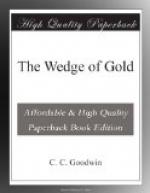THE WEDGE OF GOLD.
CHAPTER I.
The Mineral kingdom.
The splendor of the world is due to mining and to the perfectness of man’s ability to work the minerals which the mines supply. The fields of the world give men food; with food furnished, a few souls turn to the contemplation of higher things; but no grand civilization ever came to an agricultural people until their intellects were quickened by something beyond their usual occupation.
How man first emerged from utter barbarism is a story that is lost, but when history first began to pick up the threads of events and to weave them into a record, the loom upon which the record was woven was made of gold. One of the rivers that flowed through Eden also “compassed the whole land of Havilah, where there is gold; and the gold of that land is good.”
“Tubal Cain was an instructor of every artificer in brass and iron.” Abraham and Jacob bought fields with money, and when Pharaoh sought to make Joseph next in power to himself, he took the ring from his finger and put it upon Joseph’s finger; and he put a chain of gold about Joseph’s neck. Thus the grandchildren of Adam, in Holy Writ, were artificers in brass and iron, and when civilization in Egypt began to make an impression upon the world, its sovereigns had already discovered the omnipotence of gold.
Assyria, that came next to be the concernment of mankind, had men who could perfectly fuse gold and glass, and their work is still an object of wonder to the world. Their queens wore raiment which was woven from threads of gold.
The splendor of the Hebrew nation culminated when the roof of their great temple was laid with beaten gold, and when all the magnificent furnishings within the temple were wrought from gold and silver and brass.
The invincible Greeks had chariots and javelins of iron, helmets of gold and brass, and now as their tombs are rifled there is found beside where their bones went back to dust the metal implements with which they wrought, and the imperishable coins with which they carried on their commerce.
The power of Rome came when her artisans learned how to fashion the short sword, and her soldiers learned how to wield it, and her splendor came when, through conquest, she brought under her dominion the gold fields of Spain and Asia, and learned the power which money carries with it. Her civilization began to recede when the money supply began to fall off, and when it became too precious for the masses to possess it, then the race degenerated until the men were no longer fit to be soldiers, the women lost the grace to become the mothers of soldiers, and darkness settled upon Europe.




